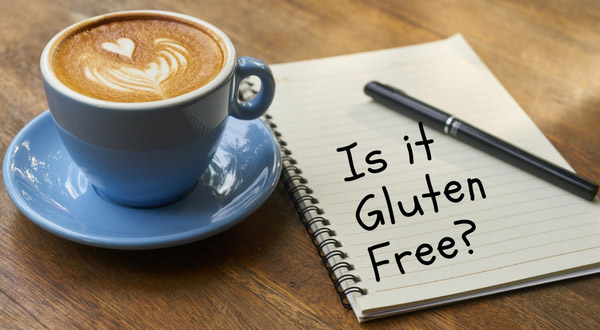Here are some of the most commonly asked questions about gluten free living and the answers:
-
Is baking powder gluten free?
Not all kinds of baking powder are gluten free, but you can very easily find a number of brands that are. Most baking powder uses various starches. Look for baking powder that uses potato starch, since it definitely doesn’t contain any gluten.
-
Is cheese gluten free?
Some kinds are, some kinds aren’t. Natural cheeses like cheddar and Swiss are typically gluten free since they only contain naturally gluten-free milk, enzymes, and salt. Flavored cheeses are more likely than not to contain gluten, as is blue cheese. Processed cheese may contain gluten depending on their additives. Packaged shredded cheese is likely to contain gluten, though there are products that have been sure to avoid gluten additives and are therefore gluten free.
-
Is coffee gluten free?
Plain coffee should be gluten free, but cross-contamination with gluten is fairly common. Flavored coffee is a risk since distilled grains are often used in its production. If you’re not sure yet if you have a bad reaction to flavored coffee, be cautious drinking it. Also remember that coffee is naturally quite hard on your digestive system, even if you don’t have a gluten allergy.
-
Is gluten free wheat free?
If only it were that simple! Gluten is contained in a lot of other grains, including rye and barley. A “wheat free” label is not the same as a “gluten free” one. Gluten is found in many other products that don’t use wheat. Don’t waste money on food that might trigger your gluten allergy! Always check the labels to be sure. Remember, all gluten free products are wheat free, but not all wheat free products are gluten free.
-
Is milk gluten free?
Milk is gluten free without additives. Milk products that contain additives might have gluten, including chocolate milk, yogurt, and ice cream. They don’t necessarily have to contain gluten, however, and there are more and more gluten free milk products on the market all the time.
-
Is peanut butter gluten free?
On their own, peanuts do not contain gluten, and neither do sugar or salt, the other ingredients in peanut butter. However, the additives often used in peanut butter can contain gluten. There is also a risk of gluten contamination during production. Most common brands of peanut butter including Jif, Peter Pan, and Smuckers do not contain any gluten, but due to (an honestly rather small) risk of contamination, are not labeled as gluten free.
-
Is rye bread gluten free?
No. Rye contains gluten like wheat and barley. Anything labeled as “gluten free rye bread” is imitation rye bread. It’s fairly easy to find these substitutes, but you’re not likely to find it at your local sandwich shop. This is also the case for rye crackers. Rye whiskey can cause an adverse reaction to people who are very sensitive. Rye, like wheat, is one of those ingredients you have to be on the lookout for if you have a gluten allergy.
-
Is yeast gluten free?
Yeast does not contain gluten, even though many people associate it with what products. Yeast is actually a fungus and has nothing to do with gluten itself. However, yeast can end up contaminated with gluten. This is generally true of brewer’s yeast. Baking yeast does not have this issue and is gluten-free.
-
Is yogurt gluten free?
Not all yogurt is gluten free, but many brands are. Yogurt consists of milk and fermented bacteria (the good kinds), all gluten free ingredients, though flavors and additives may contain gluten. You won’t have to go far to find gluten free yogurt, however, since many flavors of common brands like Chobani, Fage, and Yoplait are gluten free. That includes all GoGurt brands. Just be sure to avoid yogurts with granola, fruit, or other kinds of toppings included, often called mix ins or flips. These items typically contain gluten or are often cross-contaminated.
As you can see, there are a lot of food that can contain gluten but don’t always. The most important thing you can do to make sure your diet is gluten free is to check the labels of everything you buy. If something seems to be causing an adverse reaction similar to your gluten allergy symptoms (like indigestion or diarrhea), it may contain gluten. Part of living gluten free is paying more attention to what goes into making food and how your body reacts to eating certain things. It might start out as work, but it will quickly become second nature, especially as living gluten free will help you feel better.
For those items that don’t have gluten free versions, there are more and more substitutes out there. There is imitation rye bread, for instance, and even gluten-free baked products. Link up with gluten free online communities for some great gluten free recipes, many of which simply sub in one gluten free ingredient for an ingredient that contains gluten.
Gluten free living might seem intimidating, but it is increasingly easy to do. You don’t have to miss out on all foods you love, provided you pay attention to nutritional labels. Gluten is common, but it’s not everywhere, no matter what it may seem like. Society is developing a greater understanding of gluten allergies, meaning that more and more stores are offering gluten free alternatives to their gluten products. Many restaurants are even beginning to offer gluten free sections of their menus. You can be gluten free but still a foodie with no issue!
Have any more questions about gluten free living! Let us know!

